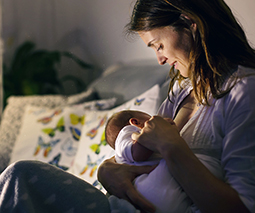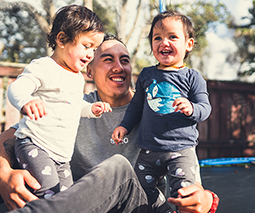5 ways to get your libido back after you have babies

Perhaps you, or someone you know, has been there? Overwhelmed with the demands of day-to-day life with a new baby, wondering where that person who actually managed to conceive (and HAVE SEX!) has gone.
Shannon O’Meara and Alice Fenton, hosts of Babyology’s podcast all about our bodies after babies, Bodyshock spoke to sexologist Pamela Supple about the tricky position many new mums find themselves in postpartum. (No pun intended!)
Here’s five things Pamela says you can do to get your libido back after you have babies:
1. Be positive and try sensate touch
Pamela advises being optimistic, and not ruling intimacy out, in favour of domestic to-dos. Take things slowly, and see what unfolds: “If I cuddle with my partner it will lead to being more intimate. We’re connecting. I’m relaxing and I’m not worrying about doing the washing.”
Taking the time to physically reacquaint yourself with your partner or your own body can lead to bigger things.
“With yourself or with a partner, connect in giving each other what I call sensate touch,” Pamela suggests. “It’s not massage per se, it’s not like remedial massage, going in and digging the muscles out – although that can be nice – but we’re talking hands over our body or even by yourself, touching yourself, touching your partner.
“It’s the lead-up, it’s the connection that hopefully we get to bond … then you will be able to relax and drop into that and think, ‘I’m enjoying being with you. I love you and yeah, you still do it for me. And yeah, I love having sex with you’.”
Listen to Pamela Supple on Bodyshock:
2. Make date nights expectation-free
Unspoken pressures can be a real libido-killer, so approaching time together as just that – rather than a ‘free sex ticket’ – builds trust and helps create real intimacy.
“Pamela explains, “You’re feeling the anticipation from either partner … this can be male or female: ‘Oh my god, when we get home, they’re going to want sex. It’s the last thing I feel like doing, I’m so full. I just want to go home and put on my comfy clothes and watch a bit of Netflix.'”
Pamela says at times like this, it’s important to re-focus on each other and take things back to basics.
“The two people that you were when you first met … that hasn’t changed. Yes, you’re getting a bit older … but the two people that you are innately, your personalities and everything, that’s the person you fell in love with.”
3. Take it gently and avoid resentment
Sometimes out-of-sync libidos can build resentment, which thwarts intimacy. Being open and honest about how you’re feeling is vital, and Pamela urges couples not to fall into the trap of simply fulfilling a perceived sexual obligation.
“Feeling that your husband or your partner is hankering for it … it can actually push you away because you know what they’re wanting and you’re not in the mood, and so you’re sort of distancing and they’re coming after you which creates that circle.
“So then you’re going … ‘God, look, I’ll just have sex’ … it can be the type of sex that your partner might think, ‘well they’re just doing it to make me feel better’. When a partner starts to feel that, that can be very hurtful for them. You would like to have some connection instead of sort of lying there and going through the motions and thinking, ‘Okay, well that’s done’.”

4. Know yourself
Pamela says a strong sense of self – and autonomy – contributes to happy and healthy sexuality.
“It’s so important to have your own space in relationships and to have your own sense of identity other than partner, husband, wife, or mum or dad, and remember who we were when we met – that still is you.
“Hopefully we give ourselves the pleasure of allowing ourselves to see what’s out there in the world and to try different things for ourselves. And if that just means taking yourself off every now and then to have a massage, whatever, do things, get your own identity … allow each other the time to have this space.”
5. Talk it out gently
Take the time to work on how you communicate, and prioritise learning to be compassionate and open with each other (sometimes easier said than done if you’re feeling overwhelmed or hurt).
“I think it’s really good for couples to just say, ‘look we’ve got to accept that this is where we’re at at the moment. We both are going to have many, many emotions around this and when we are feeling all these things that are going on with us, we have to let each other know’.
“There’s many ways to connect with your partner but communicating is a really big one,” Pamela says. “[That said] it’s the way we communicate. It’s the way we say it.”
Pamela suggests being vulnerable and gentle when approaching these important and often difficult discussions.
“Yes there are questions that need to be asked, but instead of saying ‘why?’ and asking the questions, you say, ‘You know I haven’t been feeling like this much lately, and I’ve been wondering why. Have you noticed?’ And then that opens up the conversation.”
A little forethought and kindness goes a long way and will spill over into other parts of your life together. Including the under-the-covers parts, we hope!
 Need some support to be the best parent you can be? Our Parent School parent coaching experts can help. Click to find out more or book a one-on-one session.
Need some support to be the best parent you can be? Our Parent School parent coaching experts can help. Click to find out more or book a one-on-one session.









